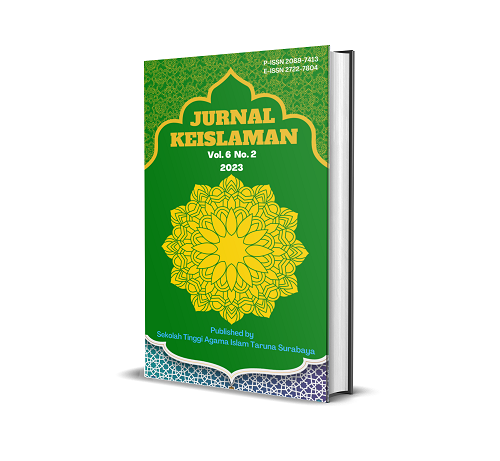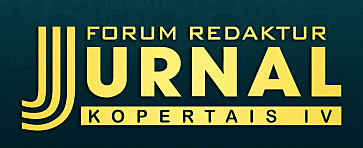Kontribusi Penggunaan Literasi Digital Terhadap Peningkatan Hasil Belajar Pendidikan Agama Islam Siswa Di SMK Pawiyatan Surabaya
Abstract
This study examines the use of digital literacy to increase the learning outcomes of PAI students at SMK Pawiyatan Surabaya. This study uses quantitative research with a correlational descriptive approach. Data collection using a questionnaire was carried out in a self-administered questionnaire, namely, the respondents answered the questionnaire themselves that had been made by the researcher. The sample used was 177 students as respondents. Hypothesis testing was carried out using the Partial Least Square (PLS) based Structural Equation Model (SEM) approach using the Smart PLS application version 3.0. The results showed that the ability to access digital tools (XI), the ability to search for information with digital devices (X2), and the ability to evaluate information from the Internet (X3) both partially and simultaneously had a significant positive effect on PAI learning outcomes (Y). Digital literacy skills are very important in learning, especially in finding PAI information with digital tools. The more professional students are in search for this information, their insights and knowledge references will increase so that student learning outcomes for PAI will also increase.References
Abidin Yunus, Pembelajaran Multiliterasi: Sebuah Jawaban atas Tantangan Pendidikan Abad ke-21 dalam Konteks Keindonesiaa (Bandung: PT. Refika Aditama), 2018.
Awaliyah Annisa Nurul, “Literasi Digital Untuk Meningkatkan Hasil Belajar Siswa Pada Pembelajaran Seni Budaya Kelas Viii Smpn 27 Makassarâ€, Volume 1, Nomor 2 (Maret, 2019).
Bawden, D, Origins and concepts of digital literacy in: Digital Literacies: Concepts, Policies and Practices (New York: Peter Lang Publishing), 2008.
Dimyati & Mudjiono, Belajar dan Pembalajaran (Jakarta: Rineka Cipta), 2012.
Efendi Agus, Revolusi Kecerdasan Abad 21 (Bandung: Alfabeta), 2005.
Fisher Alec, Berpikir Kritis “Sebuah Pengantarâ€.(Jakarta: Erlangga), 2008.
Kementrian Pendidikan dan Kebudayaan, Materi Pendukung Literasi Digital (Jakarta: Pusat Perbukuan Departemen Pendidikan Nasional), 2017.
Mansir Firman dkk, Penggunaan Literasi Digital dalam Pembelajaran Agama Islam Pada Asrama Mahasiswa Panrannuangku Takalar Yogyakarta (Yogyakarta: PROSIDING SEMNAS PPM), 2020.
Murti Diah Pracista, Yunus Winoto, “Hubungan Antara Kemampuan Literasi Informasi Dengan Prestasi Belajar Siswa Sman 1 Cibinong Kabupaten Bogorâ€, BIBLIOTIKA : Jurnal Kajian Perpustakaan dan Informasi. Universitas Padjadjaran Indonesia, Volume 2, Nomor 1, 2018.
Purwanto Ngalim, Psikologi Pendidikan (Bandumg: Remaja Rosdakarya), 2011.
Ratiwi Nani P dan Nola Pritanova, “Pengaruh Literasi Digital Terhadap Psikologis Anak dan Remajaâ€, Jurnal Semantik Pascasarjana Universitas Negeri Yogyakarta.
Riel Jeremy, Sonya Christian, & Brad Hinson, "Charting digital literacy: A framework for information technology and digital skills education in the community college", presented at Innovations 2012, hosted by the League for Innovation in the Community College, Philadelphia, PA (March: 2012).
Ropii Muhammad dan Muh. Fahrurozzi, Evaluasi Hasil Belajar (Lombok Timur: Universitas Hamzanwadi Press), 2017.
Sabri Alisuf, Psikologi Pendidikan (Jakarta: Pedoman Ilmu Jaya), 2007.
Santoso Budi, Mukhlas Triono, & Zulkifli, “ Tantangan Pendidikan Islam Menuju Era Society 5.0: Urgensi Pengembangan Berpikir Kritis dalam Pembelajaran PAI di Sekolah Dasarâ€, Jurnal JPAPEDA, Volume 5, Nomor 1 (Januari: 2023).
Sardiman A.M, Interaksi dan Motivasi Belajar Mengajar (Jakarta: Rajawali), 1992.
Satiadarma Monty P. & Fidelis, Mendidik Kecerdasan (Jakarta: Bumi Aksara), 2009.
Slameto, Belajar dan Faktor-Faktor yang Mempengaruhinya (Jakarta: Rineka Cipta), 2003.
Sudjana Nana, Dasar-Dasar Proses Belajar Mengajar (Bandung: Algesindo), 2008.
Sudjana Nana, Penilaian Hasil Proses Belajar Mengajar (Bandung: Remaja Rosdakarya), 2009.
Sukmadinata Nana Saodih, Landasan Psikologi Proses Pendidikan (Bandung: PT Remaja Rosdakarya), 2007.
Sulistyarini Winda, Siti Fatonah, “Pengaruh Pemahaman Literasi Digital Dan Pemanfaatan Media Pembelajaran Terhadap Kompetensi Pedagogik Guru Era Digital Learning,†Journal of Educational Learning and Innovation (ELIa), Volume 2, Nomor 1 (Maret, 2022).
Susilo Hadi, “Pegaruh Literasi Digital Dan Literasi Informasi Keislaman Terhadap Hasil Belajar Afektif Pendidikan Agama Islam Peserta Didik SMAN 1 Kendalâ€, (Tesis, UIN Wali Songo Semarang), 2019.
Syah Muhibbin, Psikologi Pendidikan dengan pendekatan baru (Bandung: PT Remaja Rosdakarya) , 2010.
Uno Hamzah B., Perencanaan Pembelajaran (Jakarta: PT Bumi Aksara), 2006.
Yusuf Syamsu dan Nani M, Perkembangan Peserta Didik (Jakarta: Rajawali Pers), 2011.
Yusup Pawit M. dan Priyo Subkti, Teori dan Praktik Penelusuran Informasi : Information Retrieval (Jakarta: Kencana), 2010.
Copyright (c) 2023 Bachtiar Hariyadi, Yuli Astutik, Chusnul Chotimah, Fatimatuzzahro Fatimatuzzahro

This work is licensed under a Creative Commons Attribution-ShareAlike 4.0 International License.
Authors who publish with this journal agree to the following terms:
- Authors retain copyright and grant the journal right of first publication with the work simultaneously licensed under a Creative Commons Attribution-ShareAlike that allows others to share the work with an acknowledgement of the work's authorship and initial publication in this journal.
- Authors are able to enter into separate, additional contractual arrangements for the non-exclusive distribution of the journal's published version of the work (e.g., post it to an institutional repository or publish it in a book), with an acknowledgement of its initial publication in this journal.
- Authors are permitted and encouraged to post their work online (e.g., in institutional repositories or on their website) prior to and during the submission process, as it can lead to productive exchanges, as well as earlier and greater citation of published work (See The Effect of Open Access).






















